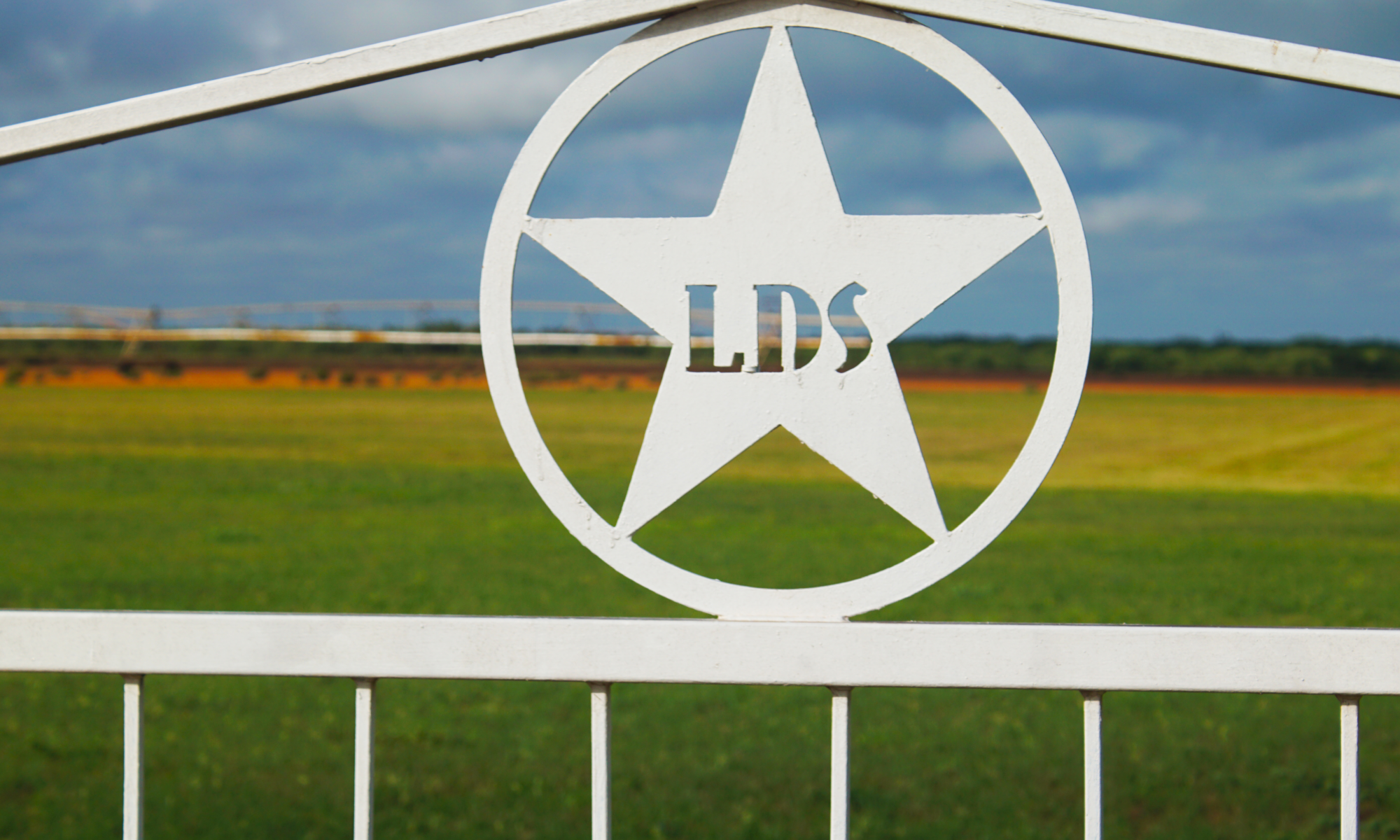By Giles Lambertson, Eagle Pass District Communications
(En español abajo)
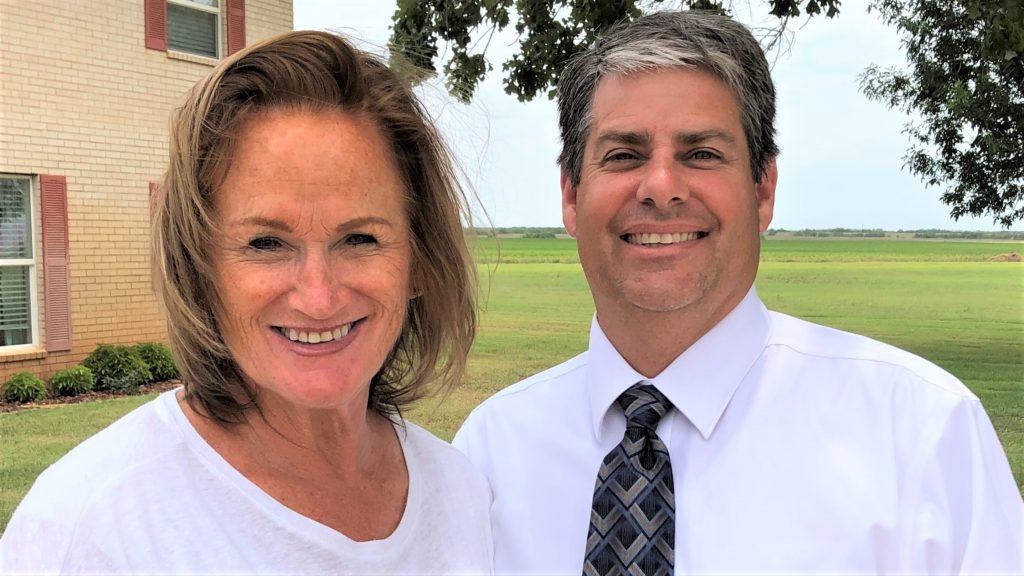
Michael Hurst manages the Church’s 2,000-acre peanuts-growing farm near Pearsall. He also serves as group leader for a congregation of Saints meeting 16 miles away in a Dilley community center under the umbrella of the Uvalde Branch. To say the Church is central in the life of Brother Hurst and his wife Marcia is not an overstatement.
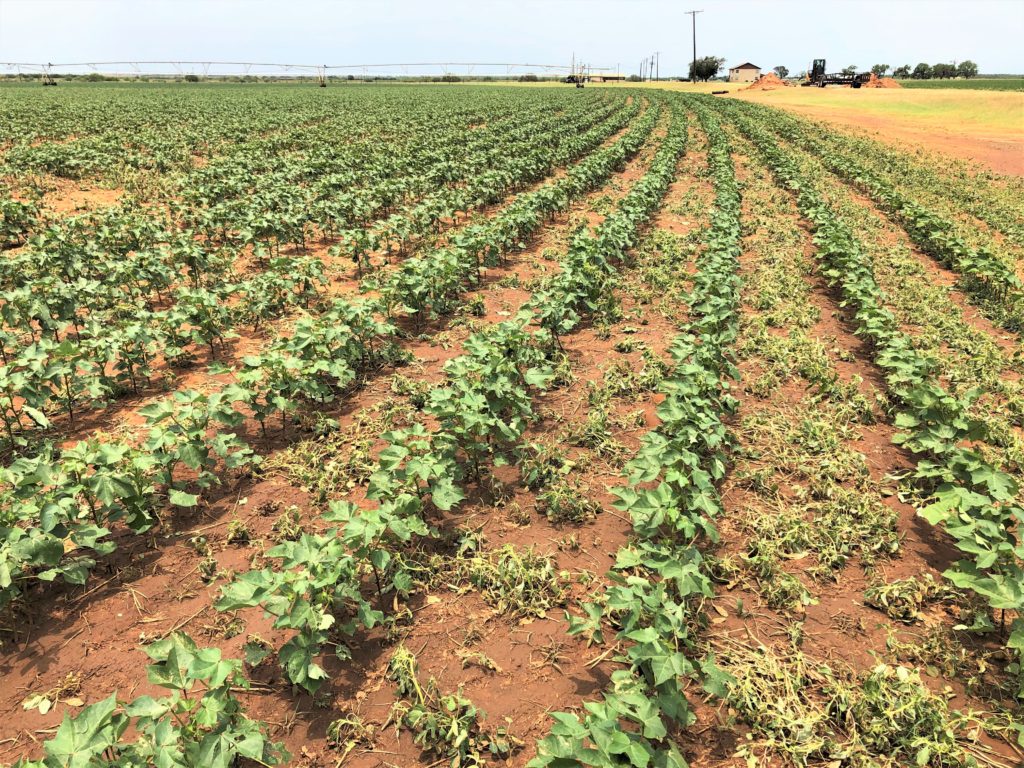
“We love being on the farm and actively participating in the Church’s welfare program. It’s like being on a mission. We hope to be here a very long time,” says the group leader.
The couple moved to the farm two years ago from San Antonio, where they had lived for eight years. Yet this is not an urban couple transplanted to a rural setting like the old television sitcom, Green Acres. The couple has bona fides as country folk.
The manager was born 50 years ago in Killeen in east-central Texas and has ranched and farmed most of his life. Marcia Hurst is a Portland, Oregon, native who grew up around horses and became a barrel racer, one of the most popular rodeo events.
They are college-trained as well. Eight years ago, Michael Hurst decided to augment his knowledge of ranching and farming by acquiring expertise with the computer: He earned an information technology degree from the University of Colorado.
Marcia Hurst has a similar educational bent. She earned a degree in nursing, which she utilized during a six-year stint in the U.S Air Force including at Lackland Air Force Base in San Antonio. After her military service, she continued her nursing work, mostly caring for children in cancer and transplant units. She then returned to school to become certified as a family nurse practitioner.
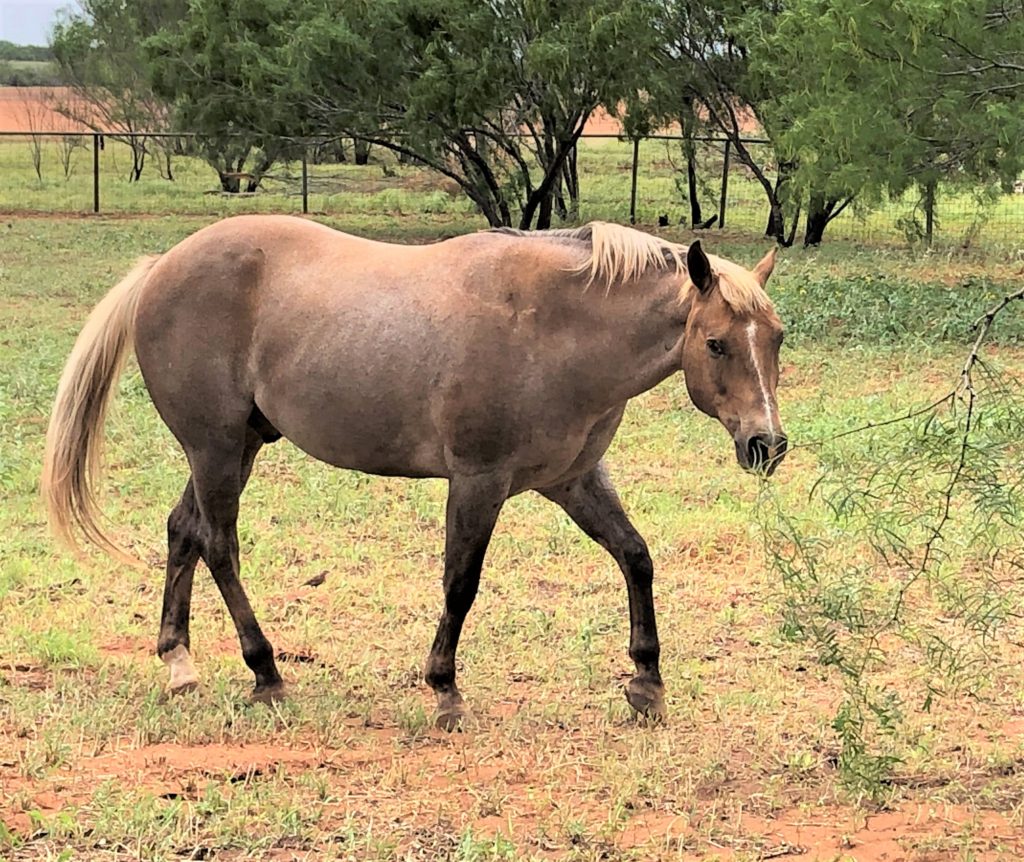
When the couple moved to the Church farm, they didn’t give up their personal interests. Stabled next to an equipment building on the property is a horse named JW. Marcia Hurst is training it at the request of an area rancher.
In another building, Michael Hurst has a 775-pound experimental class single-engine airplane. The Zenith 750 has a 120-hp aluminum engine—and wings too long to fit through the building’s doorway. He built a dolly so he can manually maneuver the plane into the hangar.
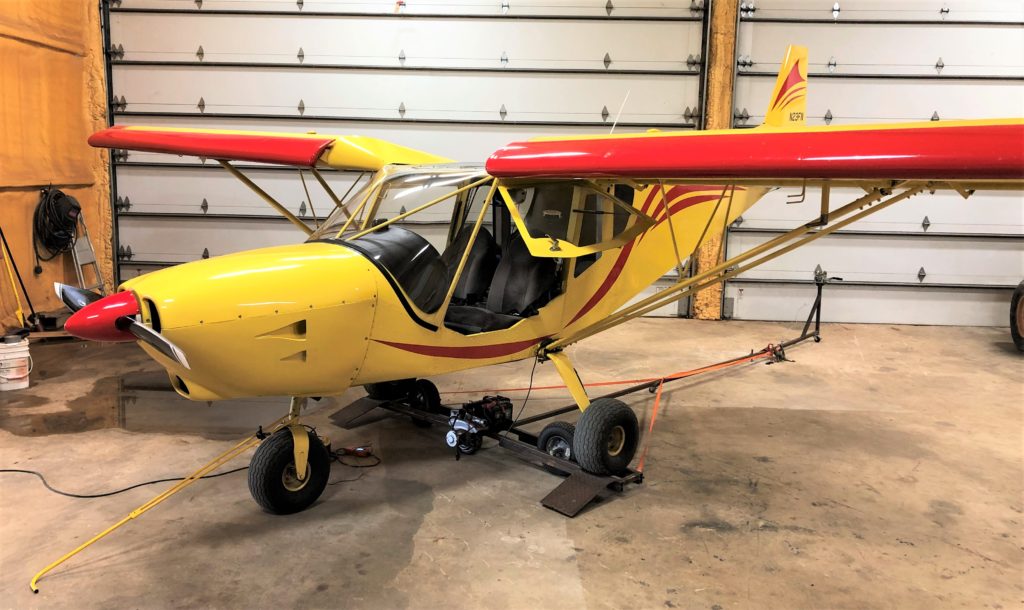
A grassy strip off the end of a planted field is of sufficient length to get the craft airborne and to land it again. In the air, it cruises at 80 mph. The manager-pilot says it can move slowly enough for him to almost hover above irrigation pivots so he can inspect them from the air. One presumes flying the plane also is just plain fun.
When the couple married, they brought together seven children: She is mother of two girls and three boys, and he has two boys. None of them are at home now, of course. One—Sam Hurst—entered the mission field in Arizona in June 2021.
In choosing to spend two years on a mission, the young Hurst followed the example of his father who served in the Louisville, Kentucky mission. Marcia Hurst became a member when she was 28 years old—too late to receive a call.
They have been active members all these years and been called to a variety of leadership positions. For example, both have served in the youth ministry—Young Men and Young Women presidencies—with Michael Hurst being Scoutmaster at one point. “Working with the youth definitely is rewarding,” says the group leader.
The couple currently is experiencing the rewards of leading a group of Church members in the Dilley Group. Sunday mornings finds them setting up a worship area in a corner of a Dilley housing development’s community building. On a slow Sabbath day, it might just be the Hursts, a missionary couple (Elder and Sister Jones), and a pair of fulltime elders.
The group is the equivalent of a start-up business, with a few participants, a temporary headquarters and a whole lot of faith in the product. “It’s pretty easy to feel like a pioneer when you’re a small group,” says Michael Hurst. “Everyone wears many hats and picks up responsibilities whenever there’s the need.”
In other words, the lack of numbers can be a positive because every individual is important to the success of the group. “We all know each other very well. It’s like a little family.”
The group leader cites the 4th section of Doctrine & Covenants as a guiding scripture. It does seem appropriate to a farm manager, with its declaration that “…behold the field is white already to harvest” as well as the admonition that anyone committing to serve God do so with the work ethic of a farmer—“with all your heart, might, mind and strength.”
Such labor, the scripture says, is “a marvelous work,” as Michael and Marcia Hurst can testify, seven days a week.
Michael Hurst administra la granja de cultivo de maní de 2,000 acres de la iglesia cerca de Pearsall. También se desempeña como líder de grupo para una congregación de santos que se reúnen a 16 millas de distancia en un centro comunitario de Dilley bajo la supervision de la Rama Uvalde. Decir que la iglesia es central en la vida del hermano Hurst y su esposa Marcia no es una exageración.
“Nos encanta estar en la granja y participar activamente en el programa de bienestar de la iglesia. Es como estar en una misión. Esperamos estar aquí muchos años”, dice el líder del grupo.
La pareja se mudó a la finca hace dos años desde San Antonio, donde habían vivido durante ocho años. Sin embargo, esta no es una pareja urbana trasplantada a un entorno rural como la vieja comedia de televisión Green Acres. La pareja bien se presents como gente del campo.
El gerente nació hace 50 años en Killeen, en el centro-este de Texas, y se ha dedicado a la agricultura y ganadería la mayor parte de su vida. La hermana Hurst es nativa de Portland, Oregon, creció rodeada de caballos y se convirtió en una corredora de barriles, uno de los eventos de rodeo más populares.
También tienen formación universitaria. Hace ocho años, el hermano Hurst decidió aumentar su conocimiento sobre ganadería y agricultura adquiriendo experiencia con la computadora: obtuvo un título en tecnología de la información de la Universidad de Colorado.
La hermana Hurst tiene una inclinación educativa similar. Obtuvo un título en enfermería, que utilizó durante un período de seis años en la Fuerza Aérea de los EE. UU., incluso en la Base de la Fuerza Aérea Lackland en San Antonio. Después de su servicio militar, continuó con su trabajo de enfermería, principalmente cuidando niños en unidades de cáncer y trasplantes. Luego regresó a la escuela para obtener la certificación como enfermera practicante familiar.
Cuando la pareja se mudó a la granja de la iglesia, no renunciaron a sus intereses personales. En el establo junto a un edificio de equipos en la propiedad hay un caballo. La hermana Hurst lo está entrenando a pedido de un ranchero del área.
En otro edificio, el hermano Hurst tiene un avión monomotor de clase experimental de 775 libras. El Zenith 750 tiene un motor de aluminio de 120 hp y alas demasiado largas para pasar por la puerta del edificio. Construyó una plataforma rodante para poder maniobrar manualmente el avión hacia el hangar.
Una franja de hierba al final de un campo plantado tiene la longitud suficiente para que la nave despegue y vuelva a aterrizar. En el aire, navega a 80 mph. El gerente-piloto dice que puede moverse lo suficientemente lento como para casi flotar sobre los pivotes de riego para poder inspeccionarlos desde el aire. Uno supone que volar el avión también es simplemente divertido.
Cuando la pareja se casó, juntaron siete hijos: ella es madre de dos niñas y tres niños, y él tiene dos niños. Ninguno de ellos está en casa ahora, por supuesto. Uno—Sam Hurst—entró al campo misional en Arizona en junio de 2021.
Al elegir pasar dos años en una misión, el joven Hurst siguió el ejemplo de su padre, quien sirvió en la misión de Louisville, Kentucky. La hermana Hurst se hizo miembro cuando tenía 28 años, demasiado tarde para recibir una llamada de misionera regular.
Han sido miembros activos todos estos años y han sido llamados a una variedad de posiciones de liderazgo. Por ejemplo, ambos han prestado servicio en el ministerio de la juventud —presidencias de Hombres Jóvenes y Mujeres Jóvenes— y el hermano Hurst fue maestro Scout en un momento dado. “Trabajar con los jóvenes definitivamente es gratificante”, dice el líder del grupo.
La pareja actualmente está experimentando las recompensas de liderar un grupo de miembros de iglesia en el Grupo Dilley. Los domingos por la mañana los encuentra instalando un área de adoración en una esquina del edificio comunitario de un desarrollo de viviendas de Dilley. En un lento día de reposo, podrían ser solo los Hurst, una pareja de misioneros (el élder y la hermana Jones) y un par de élderes de tiempo completo.
El grupo es el equivalente a una empresa emergente, con pocos participantes, una sede temporal y mucha fe en el producto. “Es bastante fácil sentirse pionero cuando se es un grupo pequeño”, dice el hermano Hurst. “Todos desempenan muchos paperless y asumen responsabilidades cuando existe la necesidad.
En otras palabras, la falta de números puede ser positiva porque cada individuo es importante para el éxito del grupo. “Todos nos conocemos muy bien. Es como una pequeña familia.”
El líder del grupo cita la sección 4 de Doctrina y Convenios como pasaje de las Escrituras guía. Sí parece apropiado para el administrador de una finca, con su declaración de que “… he aquí, el campo está blanco ya para la siega”, así como la advertencia de que cualquiera que se comprometa a servir a Dios lo haga con la ética de trabajo de un agricultor: “con todo su corazón”. , poder, mente y fuerza.”
Tal labor, dice la Escritura, es “una obra maravillosa”, como pueden testificar el hermano y la hermana Hurst, los siete días de la semana.
